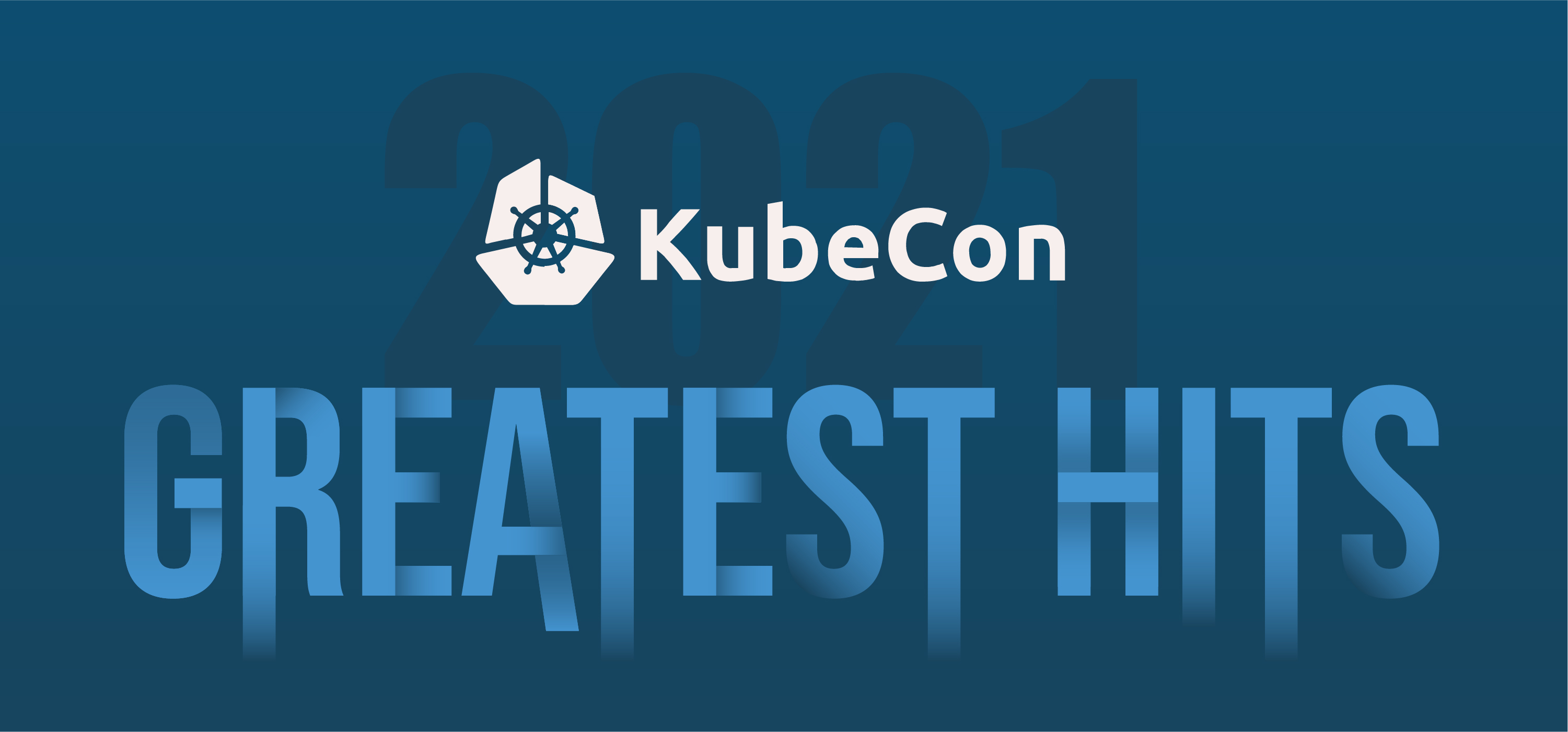KubeCon's Greatest Hits
by The Team @ Giant Swarm on May 26, 2021

KubeCon 2021 has come and gone but what we learned from it is here to stay — or at least, that’s our hope with compiling this (in-no-way-exhaustive) list of some of our favorite talks.
 Puja's greatest hits 💿
Puja's greatest hits 💿
There are three topics I’m most interested in these days: Cluster API (CAPI), Security, and Networking.
At this KubeCon, these topics were featured quite a lot and although they’re quite technical, they promise to have a big impact on Kubernetes operations as well as usage in the future. Disclaimer: this is just a very narrow slice of KubeCon and there are definitely many other great talks out there that I didn’t get to watch, yet.
Cluster API
We’ll start off with David “rawkode” McKay, who not only gives a very nice intro to the Cluster API topic but also shows how to use it “as code”, here with the Infrastructure as Code tool Pulumi.
Next up, the CAPI Deep Dive by our very own Marcel Müller and Jason DeTiberus.
3. Cluster API Provider AWS (CAPA) Update
And to follow the previous one, if you want to have a look into how this can look in action on AWS, there’s the Cluster API AWS Update.
Security
1. Hacking into Kubernetes Security for Beginners
You might have heard about this talk, as it feels like this was the most famous talk of this year's KubeCon. If you haven’t watched it yet, you’re in for a treat, no matter what you think of security.
2. Get In Containerds, We’re Going Securing: Kubernetes Sig Security is Here
Some of you might have missed it, but Kubernetes also has its own SIG Security, which is what this talk is all about.
3. Enhancing Kubernetes with the Security Profiles Operator
For those wanting to go to the next step in Kubernetes security, you should check out the Security Profiles Operator.
Networking
1. Cloud Native Networking State of the Union
This panel discussion is a great start for all new and upcoming topics in the network area.
2. Gateway API: A New Set of Kubernetes APIs for Advanced Traffic Routing
Going deeper into one of the recent developments in this area, I'd recommend getting to know the new Gateway API, which started forming at the last in-person KubeCon in San Diego, and is moving to improve ingress control within Kubernetes.
Honorable mentions
Last, but not least, I’d like to highlight two talks that caught my eye outside the above areas.
1. Why Use Managed Kubernetes?: It's Dangerous to Go Alone!
First up, Seth’s talk about why you should use Managed Kubernetes (maybe an obvious choice coming from someone who has been advocating for Managed Kubernetes for the last few years).
2. The Mother of all Kubernetes Demos
And finally, this isn't actually a KubeCon talk at all. However, it got published around the same time as this year's KubeCon and is just an amazing piece of work, by the one and only Justin Garrison.
 Łukasz's greatest hits 💿
Łukasz's greatest hits 💿
I was mainly focusing on testing, observability, and delivering applications. There were many good sessions, but here are my top 3 picks.
1. Putting Chaos Into Continuous Delivery to Increase Application Resiliency
Everyone knows that testing is important, but this talk shows a super cool idea using two projects: keptn and litmus.
In this setup, “keptn” is used to promote your new rollouts only when metrics (SLI/SLO) for the new rollout match specified criteria. Metrics are expressed as PromQL queries and taken live from the Prometheus server. The source of the metrics are tests executed with Loctus and Litmus, a chaos testing framework. Combining all of that, your release is automatically promoted, but only if it passes automated chaos testing!
2. Live Experiments with K8s Applications: Pitfalls and How to Avoid Them
This talk shows iter8.tools — a project that aims to provide measurable A/B/n testing.
This tool allows you to run a real repeatable experiment with A/B versions, in a scientific and repeatable way. Once your experiment is complete, the tool chooses your target group and automatically promotes a deployment version out of A and B, depending on which provides a better outcome.
3. Traces from Events: A New Way to Visualise Kubernetes Activities
Kspan — this project really caught my attention!
It listens to all the events emitted by Kubernetes and turns them into spans according to the OpenTracing standard. You can then store and view the traces using projects like Jaeger. This provides a really great insight into what’s going on within your cluster, how your deployments are progressing, and what is the cluster state overall. Highly recommended!
You May Also Like
These Related Stories

It's Cluster API time — are you ready?
As some of you might have seen, we’ve been working on and talking about Cluster API a lot lately. I felt like now’s a good time to review what Cluster …

The State of Kubernetes 2019
Last year I wrote a post entitled A Trip From the Past to the Future of Kubernetes. In it, I talked about the KVM and AWS versions of our stack and th …

aws-operator 2.0 managing Kubernetes clusters with CloudFormation
Our aws-operator is a Kubernetes operator that manages Kubernetes clusters running on AWS. We recently released version 2.0 of the operator that uses …